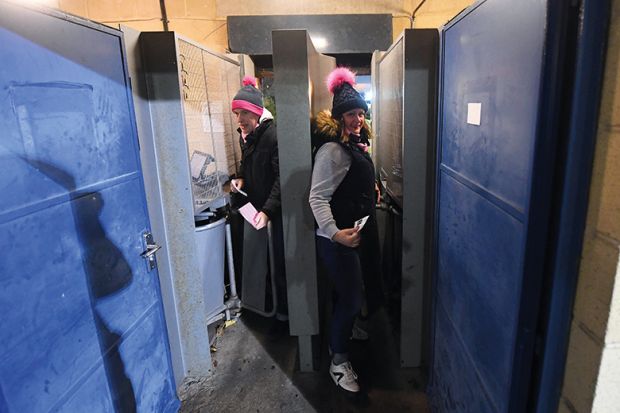English universities may have to accept the introduction of student number controls if they want to secure increased funding, according to a former Westminster adviser, who aims to work on “breaking the impasse” in his new thinktank role.
Iain Mansfield was special adviser to Gavin Williamson as education secretary, then Michelle Donelan as higher education minister, before his time in the Department for Education ended in August as Ms Donelan exited in the Boris Johnson government’s dying days.
Mr Mansfield’s influence was writ large in ministerial speeches intensely sceptical about the economic value of some higher education, or warning of free speech threats in universities. He shaped the campus free speech bill currently in the House of Lords, as well as forming plans to introduce a minimum entry requirement and student number controls that the Sunak government will decide whether to progress.
Looking at “systemic challenges for the sector”, the “biggest challenge…is the fact you’ve got this declining unit of resource and there’s no obvious mechanism for how that gets reversed, under a Conservative or a Labour government”, Mr Mansfield told Times Higher Education, after becoming head of education and research at the Policy Exchange thinktank.
The fee cap was raised to £9,250 in 2017, but it will be frozen there until at least 2024-25. In the long term, declining funding will “really threaten the quality of our university sector”, said Mr Mansfield.
“My own view on this is that as long as you have uncontrolled [student] numbers, then you will see a declining unit of resource,” he continued. In other sectors such as the NHS, there is control on costs, Mr Mansfield argued: “Everywhere else, Treasury can control.”
“I think the Treasury’s concern overall is on value and quality and return on investment,” he continued. “I certainly saw very little appetite anywhere [in government] really to put more money into the sector as it stands at the moment.
“Controls don’t necessarily have to mean contraction,” Mr Mansfield went on, and concerns about student number controls “can be overdone” given that they operated until 2015.
At Policy Exchange, Mr Mansfield hopes to do work on “breaking the impasse” in funding. He said: “I’d love to move the conversation away from how do we raise the money – ie, grant or graduate tax or fees – and back to what’s actually the more central question, which is: how much money is going to universities?…Should we be making it more? If so, how do we do that in a way that can have buy-in?”
Some vice-chancellors would argue that, with UK universities being one of the nation’s few world-class exports, ministers’ tone while Mr Mansfield was in office was too hostile.
“I don’t really recognise that,” Mr Mansfield said. He highlighted “fantastic working with universities on international students”, with the 600,000 target for UK international student recruitment achieved well ahead of schedule.
But some courses have dropout rates or employment prospects that are “very bad compared to peers”, he added. “It’s only right we answer those questions, just as we would require a school that was performing very badly or an NHS trust that was well below its peers to answer those.”
Is he a “culture warrior”?
“I don’t like that description,” said Mr Mansfield. “Free speech has always been traditionally very much a classic liberal value which has been accepted across our society.”
He continued: “Thankfully, we haven’t got the levels of polarisation around HE that you see in the US. Actually, maintaining that sort of consensus is important if we want to maintain long-term support for our institutions.”
The Johnson government in which Mr Mansfield served had levelling-up in the regions as its stated aim. Is place neglected in England’s market-led higher education system?
That is “a really fair challenge”, said Mr Mansfield. If student numbers were controlled and “you had a little more stability in the system, you do start bringing out the possibility of using grant funding, for example, to boost areas that you want to level up, or create incentives to grow in particular [subject] areas…while being respective of autonomy for universities”, he argued.
Universities such as “Derby, Lincoln, Sunderland, Portsmouth…have really shown they can deliver high-quality education really connected to their region, great graduate outcomes for people from a really wide range of backgrounds,” he went on.
But he added: “One of the challenges of the current system is it’s very hard for government…to build on that.”
后记
Print headline: Accept numbers cap for fee rise, v-cs told




